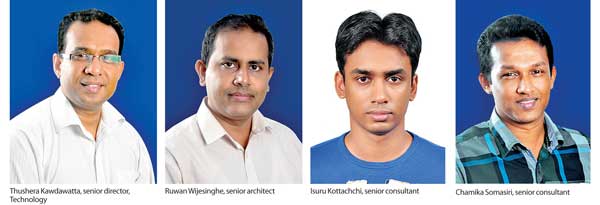07 Apr 2016 - {{hitsCtrl.values.hits}}
 The role of a software architect today stretches beyond core technical activities to being a strategic, business oriented consultant. This role demands the ability to engage with a variety of different stakeholders, gain insight into different systems, manage expectations, solicit the client’s ‘buy in’ to the solution, advocate standards and best practices, and create a competitive edge for the business through innovation and creativity.
The role of a software architect today stretches beyond core technical activities to being a strategic, business oriented consultant. This role demands the ability to engage with a variety of different stakeholders, gain insight into different systems, manage expectations, solicit the client’s ‘buy in’ to the solution, advocate standards and best practices, and create a competitive edge for the business through innovation and creativity.
Having identified these evolving demands, Virtusa launched the ‘Future Architects’ programme with the aim of enhancing the skills of their senior consultants and enabling them to make the transition.
Thushera Kawdawatta, senior director, Technology and chief software architect at Virtusa, explains the importance of this program for their employees.
“We have always invested in our employees for it is they who help us reimagine our clients’ future. Therefore, programs like thisnot only help us meet a need in the market, but also give us the opportunity to help these talented individuals grow their skills and meet life goals and aspirations.”
“The key opportunity for them is to get involved in hardcore architectural concepts, best practices and standards and carefully evaluate trade-offs in order to provide optimal business solutions. Additionally, this program will develop their ability to convincingly articulate these concepts to the client,” he adds.
The programme will take place over three months and consists of four assignments, two challenges and continuous evaluation and feedback.
The assignments consist of simulated client problems based on real world situations, which can be solved in many different ways. This means candidates will need to accurately assess the situation before deciding on the best path that will fit the client’s needs.
Isuru Kottachchi, senior consultantat Virtusa is a participant in the Future Architects programme. Calling attention to the advantage of practical experience, Isuru says, “Most engineers lack the opportunity to work on a solution beyond boundaries and usually adapt to a standard solution designed by experts. However, in this program we are given the opportunity to think outside of a defined framework and formulate solutions that meet the client’s needs ourselves.”
“We get that extra hands-on experience which gives us greater insight into the role of a software architect,” he adds.
These solutions are then presented to a panel of judges who will act as the client. Evaluations of the solutions are followed by feedback of the candidate’s strengths and weaknesses, both in the solution as well as in the presentation.
“The success factor of this program is the learning process of justifying and selling my solution to the diverse panel of judges,” says Chamika Somasiri, a senior consultant and another participant in the Future Architects program.
“They are thorough in their evaluations and their feedback allows us to not only view our errors, but also to look at the solution from a different perspective. This further expands our thinking,” adds Chamika, who has over five years of experience in .Net technology.
Ruwan Wijesinghe is a senior architect at Virtusa and heads the NET CEG. He is one of the key mentors of this programme.
“The mentorship aspect of the program is invaluable as it gives candidates access to a wealth of knowledge and experience not easily found through self-learning, while also giving them a different perspective from which to view problems. The guidance they receive from mentors will shape the path of their careers,” says Ruwan.
In addition to having access to mentors who will guide them through the program, candidates also have the opportunity to attend TED Talks by senior software architects. These sessions are designed to inspire as well as provide a deeper understanding of the responsibilities they will be undertaking.
10 Jan 2025 46 minute ago
10 Jan 2025 2 hours ago
10 Jan 2025 3 hours ago
10 Jan 2025 5 hours ago
10 Jan 2025 5 hours ago